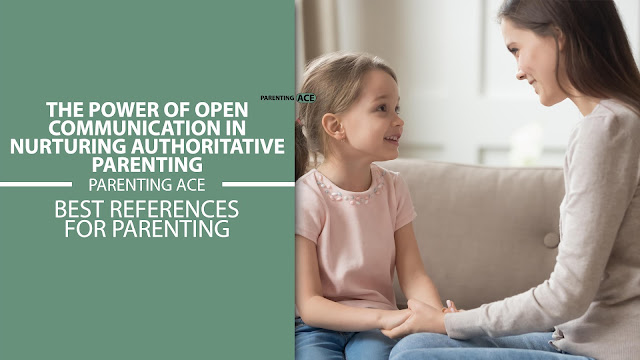The Power of Open Communication: Fostering Authoritative Parenting
In the intricate journey of parenting, fostering open communication emerges as a cornerstone of nurturing healthy relationships and guiding children towards positive development. In this blog post, we explore the profound connection between open communication and the characteristics of authoritative parenting. Delving into the delicate balance of warmth, clear expectations, and responsiveness, we uncover how cultivating a culture of open dialogue strengthens the parent-child bond, promotes emotional intelligence, and lays the foundation for resilient, confident individuals. Join us as we unravel the transformative power of open communication within the framework of authoritative parenting, shaping the course of meaningful connections and growth in family dynamics.
 |
| The Power of Open Communication in Nurturing Authoritative Parenting |
Parenting is a delicate dance between nurturing and guidance, with communication acting as the invisible thread that weaves through every interaction. Among the various parenting styles, authoritative parenting stands out as a beacon of balance and understanding. Central to this approach is the concept of open communication—an invaluable tool that fosters mutual respect, trust, and cooperation between parents and children. In this article, we delve into the characteristics of authoritative parenting and explore how open communication serves as its cornerstone, shaping positive parent-child relationships and nurturing healthy development.
Understanding Authoritative Parenting
Authoritative parenting, as identified by developmental psychologists, combines high levels of responsiveness and demandingness. Parents who adopt this style are warm, nurturing, and empathetic, while also setting clear expectations and boundaries. Unlike authoritarian parenting, which is characterized by strict control and little warmth, or permissive parenting, which lacks structure and discipline, authoritative parents strike a harmonious balance between support and guidance.
Characteristics of Authoritative Parenting
- Warmth and Support: Authoritative parents provide a nurturing and supportive environment for their children. They express love and affection openly, creating a secure emotional foundation for their children to thrive.
- Clear Expectations: Despite their warmth, authoritative parents are firm in their expectations. They set clear rules and boundaries, allowing children to understand what is expected of them while still granting them autonomy within those boundaries.
- Open Communication: Perhaps the most defining characteristic of authoritative parenting is open communication. Parents encourage their children to express their thoughts, feelings, and concerns freely, without fear of judgment or repercussion.
- Responsiveness: Authoritative parents are responsive to their children's needs and emotions. They listen attentively, validate their feelings, and offer support and guidance when needed.
- Consistent Discipline: While authoritative parents are nurturing, they also enforce consequences for inappropriate behavior. However, these consequences are implemented in a fair and consistent manner, emphasizing teachable moments rather than punishment.
The Role of Open Communication
At the heart of authoritative parenting lies open communication. This means not only listening to children but also actively engaging in meaningful dialogue with them. By fostering open communication, parents create an environment where children feel valued, respected, and understood.
Open communication serves several crucial purposes within authoritative parenting
- It builds trust: When children feel heard and understood, they develop trust in their parents and are more likely to seek their guidance and support.
- It promotes problem-solving: By encouraging children to voice their concerns and opinions, parents empower them to become active participants in finding solutions to challenges they may encounter.
- It strengthens the parent-child bond: Regular, open communication fosters a deep sense of connection between parents and children, strengthening the bond that is essential for healthy development.
- It fosters emotional intelligence: Through open communication, children learn to identify and express their emotions effectively, setting the stage for healthy emotional development.
Practical Strategies for Open Communication
- Create a safe space: Establish an environment where children feel comfortable expressing themselves without fear of judgment or criticism.
- Practice active listening: Pay close attention to what your child is saying, and validate their feelings by reflecting back what you've heard.
- Be empathetic: Show empathy and understanding towards your child's experiences and emotions, even if you may not agree with them.
- Encourage dialogue: Initiate open-ended conversations that encourage your child to share their thoughts, feelings, and experiences.
- Lead by example: Demonstrate respectful communication in your interactions with your child, modeling the behavior you wish to see.
In the intricate tapestry of parenting, authoritative parenting emerges as a guiding light, offering a balanced approach that nurtures children's autonomy while providing structure and support. At its core lies open communication—a powerful tool that fosters trust, strengthens relationships, and promotes healthy development. By embracing open communication within the framework of authoritative parenting, parents can lay the groundwork for their children to become confident, empathetic, and resilient individuals capable of navigating life's challenges with grace and integrity.



Comments
Post a Comment